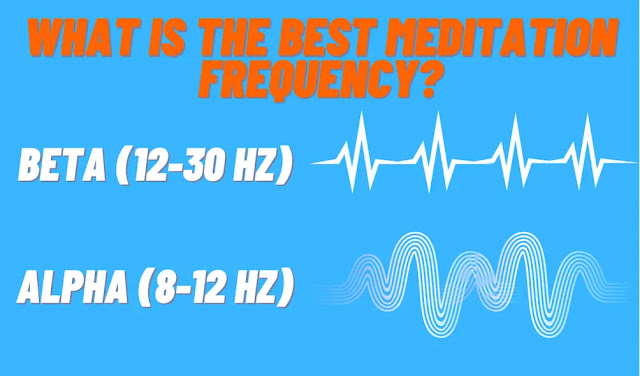What Is the Best Meditation Frequency?
The Best Meditation Frequency for you depends on your individual needs and goals. Beta frequency can help with focus and concentration, alpha frequency can help with relaxation and creativity, theta frequency can help with deep relaxation and pain management, and delta frequency can help with sleep.
Experimenting with different frequencies and finding what works best for you can lead to a more effective and enjoyable meditation practice.
Gamma (30-100 Hz)
Beta (12-30 Hz)
Alpha (8-12 Hz)
Theta (4-8 Hz)
Delta (0.5-4 Hz)
Each of these waves corresponds to a different state of consciousness, with gamma being the most active and delta being the most relaxed.
Meditation is a powerful tool that can be used to help calm the mind, reduce stress, and increase overall wellbeing. One question that often arises when it comes to meditation is, what is the best frequency to meditate at? In this article, we will explore the different frequencies that can be used for meditation and discuss which one may be the best for you.
Understanding Brain Waves
Before we dive into the different frequencies that can be used for meditation, it's important to understand a little bit about brain waves. Our brains produce different types of waves depending on our state of consciousness. These waves are typically broken down into five categories:
Gamma (30-100 Hz)
Beta (12-30 Hz)
Alpha (8-12 Hz)
Theta (4-8 Hz)
Delta (0.5-4 Hz)
Each of these waves corresponds to a different state of consciousness, with gamma being the most active and delta being the most relaxed.
Different Meditation Frequencies
When it comes to meditation, there are a few different frequencies that are commonly used:
Beta Frequency (12-30 Hz)
The beta frequency is the most common brain wave frequency during our waking hours. This frequency is associated with alertness, focus, and concentration. Meditating at this frequency can help improve focus and concentration.
Alpha Frequency (8-12 Hz)
The alpha frequency is associated with a relaxed, meditative state. It's often referred to as the "calm and creative" state. Meditating at this frequency can help reduce stress and improve creativity.
Theta Frequency (4-8 Hz)
The theta frequency is associated with deep relaxation and meditation. It's often referred to as the "dream state" and is associated with increased creativity, intuition, and spiritual connection.
Delta Frequency (0.5-4 Hz)
The delta frequency is associated with deep sleep and unconsciousness. Meditating at this frequency can be beneficial for improving sleep and reducing anxiety.
Choosing the Best Frequency for You
So, which frequency is the best for you? The answer to this question really depends on your individual needs and goals. If you're looking to improve focus and concentration, meditating at the beta frequency may be the best option for you. If you're looking to reduce stress and increase creativity, the alpha or theta frequencies may be more beneficial. And if you're looking to improve sleep or reduce anxiety, the delta frequency may be the best choice.
Ultimately, the best frequency for you is the one that feels most comfortable and effective for your individual needs. Experimenting with different frequencies and seeing how your body and mind respond can be a helpful way to determine which frequency is the best fit for you.
Conclusion
Meditation is a powerful tool that can help improve mental and physical wellbeing. When it comes to choosing the best frequency to meditate at, it's important to consider your individual needs and goals. Whether you choose to meditate at the beta, alpha, theta, or delta frequency, the benefits of regular meditation can be profound.
FAQs
1. Can I meditate at multiple frequencies?
Yes, it's possible to meditate at multiple frequencies. Some people may choose to start their meditation at a higher frequency and then gradually shift to a lower frequency.
2. How long should I meditate for?
The length of time you should meditate for will vary depending on your individual needs and goals. Many people find that starting with just a few minutes of meditation each day and gradually increasing the time can be helpful.
3. Can meditation help with anxiety?
Yes, meditation can be a helpful tool for reducing anxiety. Meditating at the theta or delta frequency may be particularly beneficial for reducing anxiety.
4. Is it better to meditate with music or in silence?
Whether to meditate with music or in silence is a matter of personal preference. Some people find that music can help them relax and focus, while others prefer the quiet of silence. Experimenting with both options can help you determine which works best for you.
5. Can meditation be harmful?
Meditation is generally considered safe and beneficial for most people. However, if you have a history of mental illness or are currently experiencing severe anxiety or depression, it's important to talk to a healthcare professional before starting a meditation practice. Additionally, some people may experience uncomfortable sensations or emotions during meditation, but these are usually temporary and can be addressed with guidance from a qualified meditation teacher.
6. Can meditation help with physical pain?
Yes, meditation can be helpful for managing physical pain. It can help you develop a greater awareness of your body and sensations, which can help reduce the intensity of pain. Meditating at the theta frequency may be particularly beneficial for pain management.
7. How often should I meditate?
The frequency of your meditation practice will depend on your individual needs and goals. Many people find that meditating daily for at least a few minutes can be helpful for developing a consistent practice and experiencing the benefits of meditation.
8. Can meditation improve my overall wellbeing?
Yes, regular meditation can be beneficial for improving overall wellbeing. It can help reduce stress, improve focus and concentration, increase creativity, improve sleep, and enhance feelings of calm and relaxation.
In conclusion, the best meditation frequency for you is one that aligns with your individual needs and goals. Whether you choose to meditate at the beta, alpha, theta, or delta frequency, regular meditation can be a powerful tool for improving mental and physical wellbeing. By experimenting with different frequencies and developing a consistent meditation practice, you can experience the benefits of meditation and improve your overall quality of life.
You May Also Like



0 Comments